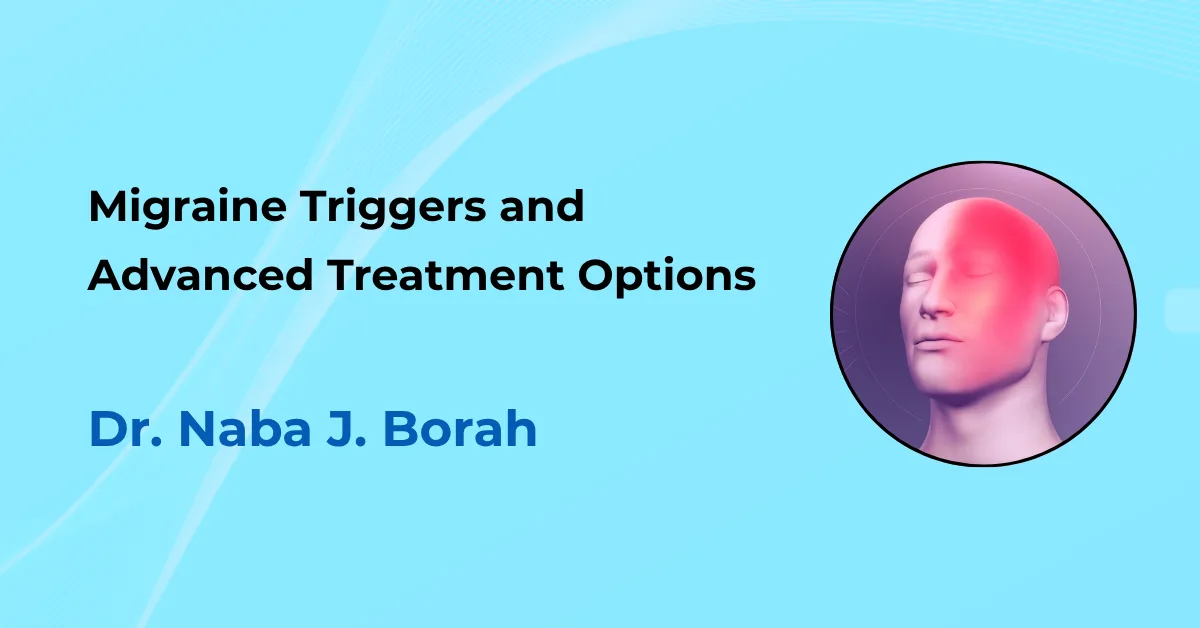
Migraines are a debilitating neurological disorder affecting millions worldwide, including a significant portion of the population in Northeast India. Characterized by intense, throbbing headaches often accompanied by nausea, photophobia, and sensory disturbances, migraines can severely impact quality of life.
Understanding the common migraine triggers and exploring advanced treatment options are critical steps in effective chronic migraine management.
What Is a Migraine?
A migraine is more than just a headache. It is a chronic neurovascular disorder involving complex interactions between the brainstem, trigeminal nerve system, and vascular pathways. Migraines can present with:
- Prodrome: Early warning symptoms like mood changes, food cravings, or neck stiffness
- Aura: Visual or sensory disturbances preceding the headache in some patients
- Headache phase: Moderate to severe pulsatile headache, often unilateral
- Postdrome: Fatigue, confusion, or sensitivity following the attack
Common Migraine Triggers
Migraine attacks can be precipitated by various internal and external factors. Identifying and avoiding these triggers is an essential part of migraine prevention strategies.
1. Dietary Triggers
- Caffeine: Both excessive intake and withdrawal can trigger migraines
- Alcohol: Especially red wine and beer
- Certain foods: Aged cheeses, processed meats, monosodium glutamate (MSG), artificial sweeteners, and nitrates
2. Hormonal Changes
Fluctuations in estrogen levels, especially in women, can precipitate migraines — commonly around menstruation, pregnancy, or menopause.
3. Stress and Sleep Disturbances
Emotional stress and irregular sleep patterns are well-known triggers.
4. Environmental Factors
Bright or flickering lights, loud noises, strong smells, and weather changes can provoke attacks.
5. Physical Factors
Intense physical exertion or sudden head movements.
Advanced Treatment Options for Migraines
While lifestyle modification and trigger avoidance are first-line strategies, many patients require migraine medications or medical treatment to reduce frequency and severity of attacks.
1. Acute Treatments
- NSAIDs and analgesics: For mild to moderate attacks
- Triptans: Selective serotonin receptor agonists targeting migraine pathways, effective in aborting attacks
- Anti-nausea medications: To manage associated symptoms like vomiting
2. Preventive Therapies
Used for patients with frequent or severe migraines.
- Beta-blockers (e.g., propranolol): Reduce frequency of attacks
- Antiepileptic drugs (e.g., topiramate): Modulate neural excitability
- Antidepressants (e.g., amitriptyline): Also effective in prevention
3. Newer Therapies and Neuromodulation
- CGRP inhibitors: A novel class targeting calcitonin gene-related peptide pathways involved in migraine pathogenesis
- Botulinum toxin (Botox) injections: Approved for chronic migraine prevention
- Migraine neuromodulation devices: Non-invasive methods such as transcranial magnetic stimulation (TMS) and vagus nerve stimulation (VNS) showing promising results
When to Consult a Neurologist or Neurosurgeon
Patients experiencing frequent, severe, or treatment-resistant migraines should seek specialist evaluation. A neurologist or neurosurgeon can:
- Confirm diagnosis and rule out secondary causes
- Tailor preventive and acute treatment plans
- Consider advanced interventions for refractory cases
Dr. Naba J. Borah’s Approach to Migraine Care
Dr. Borah combines evidence-based medical management with patient education and lifestyle counseling to provide comprehensive migraine care. The goal is to minimize attacks, improve function, and enhance quality of life through personalized treatment strategies.
Final Thoughts
Migraines are complex neurological disorders that require a multifaceted approach. Awareness of triggers combined with modern chronic migraine management and treatment options offers hope to millions affected by this condition.
If migraines interfere with daily life, consultation with a specialist is key to effective management and relief.
Contact Information
Dr. Naba J. Borah
Neurosurgeon, Health City Hospital, Guwahati
📞 Phone: +91-9864516798
💬 WhatsApp: +91-8404061190
🌐 Website: drnabajborah.com/contact-us
Disclaimer: For serious or life-threatening conditions, please visit your nearest emergency center immediately.
Disclaimer:
This article is intended for informational purposes only and should not be used as a substitute for medical advice from a qualified professional. In case of a medical emergency, contact your nearest healthcare provider immediately.
